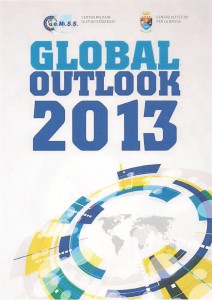
This is the first-ever MoD short-term forecast and global vision (in its 67 year history).
GLOBAL OUTLOOK 2013
PDF: 2013-06 Italian MOD Global Forecast
Executive Summary
The next two years will be marked more by power vacuums and gaps than by a reassuring graceful degradation of the world order or by the rise of new power constellations. For this reason it is necessary to change the traditional geographic subdivision still built around the borders of nation states into a new vision more adapted to present and future realities. In fact one should conceive global relationships as wide area geopolitical and geoeconomic networks (i.e. geonetworks) crisscrossed by shaping flows.1

The Pacific Geonetwork is dominated by the shift of the strategic centre of gravity towards the Chinese Sea that is the focus of acute maritime controversies. The backdrop is provided by the ambiguous and controversial bond between China and the United States, who are interdependent through the dynamics of the economic global crisis. The banking sector is a particularly critical area because on one hand the US banks are still very vulnerable to higher interest rates (no stress tests have been carried out regarding this emergence) and because the US shadow financial system is practically still unregulated, with serious consequences on national debt as security risk. On the other the Chinese shadow lending system risks to cause another financial crisis with €1,4 billion outstanding wealth manage ment products. There is a serious recovery effort by the USA in the Pacific Ocean, but for the time being military action will be ruled out (Korean crises apart, which remain a serious concern) because the whole American continent is witnessing major political reorganization in all leading countries (USA, Mexico, Venezuela and Brazil).
The Indian Geonetwork is characterised by a strategic China-India rivalry that is moving away from the traditional confrontation along the mountainous arc of Himalaya; the fight for influence is now centred on increased air-sea presence in the Indian Ocean, despite the fact that Washington is the dominant naval power. At the same time a fluid relationship between China, India and the USA is emerging around a tangle of rather converging interests that could isolate Pakistan in the medium term, once the military part of the intervention in Afghanistan will end. The country itself will concentrate more on its internal transition after the 2013 parliamentary polls in May.
The African Geonetwork is marked by the paralysis of the three leading countries (Egypt, Nigeria, and South Africa) due to internal tensions or to post-revolutionary processes. This situation is contrasted with the diffusion of political and economic actions by China, USA, India, Brazil and Turkey. The continent is expected to grow (with an aggregated GDP in the Sub-Saharan area similar to a BRIC-country) and the conflicts in the Horn of Africa, especially Somalia, will probably wane. On the other hand it will be difficult to terminate the long conflict for the control of key mining resources in the Democratic Republic of Congo or the control about oil economies along the White Nile.
Regarding the Atlantic Geonetwork, one can clearly discern a double void of political and strategic initiative vis-à-vis the management of the global economic crisis and the possible choices in supporting the outcomes of the Arab Revolutions. It is clear that the two major actors, Europe and United States are very concentrated on their internal front. The EU is defending the Eurozone against a financial assault, that is one of the fronts of the global crisis (the other being the Pacific), whereas Washington was stuck until June 2013 in inconclusive negotiations within a paralysed Congress on the fiscal cliff. A possible deal could emerge by mid-June 2013. Also two main regional actors like Russia and Turkey have difficulties in playing a significant role due either to persistent internal deficiencies or to the loss of their primary foreign policy vectors. Turkey is also involved in a very delicate balancing act between peace talks with Kurdish rebels and the Taksim Square revolt.
Cross-Sector Issues (next section) include:
Ecosystem
Drinking Water
Food/Agrotech
Real/Virtual Migration
Conventional/Non-conventional Energy
Financial and invested Capital
Knowledge in its wider sense
PDF: 2013-06 Italian MOD Global Forecast



